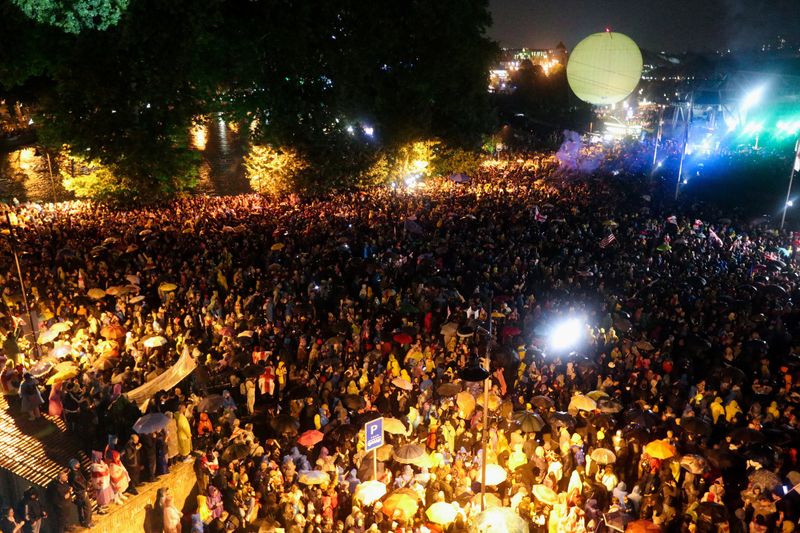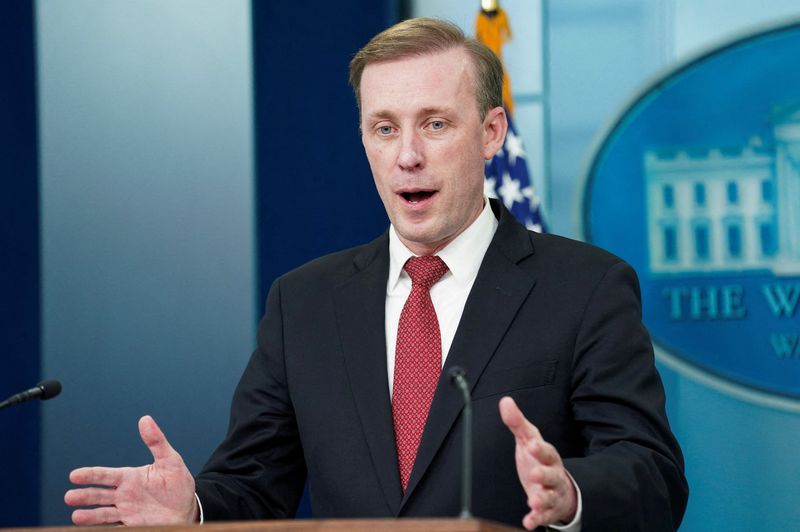By Felix Light
TBILISI (Reuters) -About 50,000 opponents of a "foreign agents" bill marched peacefully in heavy rain through the Georgian capital on Saturday, after the United States said the country had to choose between the "Kremlin-style" law and the people's Euro-Atlantic aspirations.
"We are deeply alarmed about democratic backsliding in Georgia," White House national security adviser Jake Sullivan wrote on X.
"Georgian Parliamentarians face a critical choice - whether to support the Georgian people’s EuroAtlantic aspirations or pass a Kremlin-style foreign agents' law that runs counter to democratic values," he said. "We stand with the Georgian people."
The bill, which would require organisations receiving more than 20% of their funding from abroad to register as "agents of foreign influence", has touched off a rolling political crisis in Georgia, where thousands have taken to the streets to demand the bill be withdrawn.
The crowd on Saturday waved Georgian, European Union and some Ukrainian flags and in a break with the past, included more older protesters as well as the many young people who have thronged the streets over the past month.
"The government should hear the free people of Georgia," said one protester in her 30s who gave her name as Nino, waved a large Georgian flag and led one of three columns that converged on the city centre, which blocked much of the city's roads and filled the cobblestoned heart of Tbilisi's old town.
"We want to enter the European Union with our proud nation and our dignity," she said.
Anuki, a 22-year-old student of acting, said it was her generation's responsibility "to make sure that our future and the future of generations after us are safe, that they have freedom of speech, and they are free, basically."
"And we don't want to be part of Russia," she added. "We never wanted to be part of Russia. And it has always been and always will be our goal to be part of Europe."
Parliament, which is controlled by the ruling Georgian Dream party and its allies, will begin committee hearings on the bill's third and final reading on Monday. Opposition groups had called for a fresh wave of protests from Saturday.
The crisis has pitted the Georgian Dream ruling party against a coalition of opposition parties, civil society, celebrities and the country's figurehead president, with mass demonstrations shutting down much of central Tbilisi almost nightly for more than a month.
Georgian opponents of the bill have dubbed it "the Russian law", comparing it to legislation used to target critics of President Vladimir Putin's Kremlin.
The European Union, which granted Georgia candidate status in December, has said that the bill will pose a serious obstacle to further integration if passed.
Georgian Dream says the bill will promote transparency and Georgian national sovereignty.
Bidzina Ivanishvili, the founder of Georgian Dream, has said the law is necessary to stop the West trying to use Georgians as "cannon fodder" in a confrontation with Russia.

Sullivan said that Georgian Dream appeared to be deliberately trying to break with the West, even as both the ruling party and Georgian public opinion has traditionally been in favour of the country's joining the EU and the U.S.-led NATO military alliance.
Sullivan wrote: "Georgian Dream’s recent rhetoric, proposed legislative changes, and actions go against the aspirations of the Georgian people and are designed to isolate Georgians from the United States and Europe."
